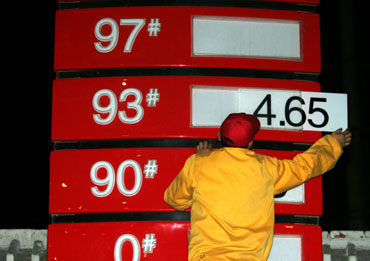The central government is considering deregulating prices of processed oil
amid record high global crude prices, a senior economic official said yesterday
in Beijing.

A Chinese worker changes a price tag of the
oil price board at a gas station in China's capital Beijing March 26,
2006. China will raise retail diesel and gasoline prices for the first
time in eight months this weekend, but the 3-5 percent increase will leave
refiners in the red and do little to deter fuel demand.
[Reuters] |
Industry analysts say once
controls are lifted, China's oil prices, which are currently much lower than
international levels, will increase markedly.
"The market should be the guide in a pricing system, but at the same time,
the government should be the regulator," said Zhu Hongren, deputy director of
the Economic Operation Bureau of the National Development and Reform Commission,
at a press conference in Beijing yesterday.
But Zhu said he did not know when the new pricing mechanism would be
announced by the State Council, China's central government.
China has taken gradual steps to decentralize crude and processed oil prices,
which were fully under government control before 1998. Since then, the
government has allowed domestic crude oil prices to move with the global market.
However, refined oil prices remain detached.
Oil prices have rocketed since 2003, with crude oil reaching more than US$60
per barrel on the international market this year, far higher than the price paid
for the commodity by domestic users. Prior to the price hikes nationwide, the
retail price of domestically processed oil was only about US$43 per barrel.
The government-dominated pricing system has prevented price fluctuations of
many daily necessities and products, but the mainland's oil refineries have born
the financial brunt.
PetroChina, the nation's biggest oil company, said in Beijing that it lost
19.8 billion yuan (US$2.4 billion) on refining and fuel sales in 2005.
"At the same time, we have to reform the pricing system because of China's
commitment to the World Trade Organization," said a researcher with the Energy
Research Institute under the National Development and Reform Commission.
China has promised to open its oil refining market to foreign investors by
the end of 2006. "Therefore decentralized prices and improved competitiveness of
domestic refineries are essential," said the researcher, on the condition of
anonymity.
But he said the new pricing mechanism would not be announced in the near
future, despite the fact that oil prices jumped past US$75 a barrel on Friday on
the New York Mercantile Exchange.
"We adjusted prices last month and maybe some disadvantaged groups are still
feeling the impact, with government subsidies yet to materialize," said the
researcher.
At the end of last month, the commission decided to increase ex-factory
petrol prices by 300 yuan (US$37.5) per ton and the cost of diesel by 200 yuan
(US$24.9) per ton.
Retail prices for petrol have also gone up by 250 yuan (US$30.8) per ton,
while diesel prices were increased by 150 yuan (US$18.5) a ton.
To offset the impact of the rises on sensitive groups, the commission said
the State Council has decided to offer subsidies to communities such as
fishermen, farmers, State-owned forestry enterprises and urban public
transportation firms.
(China Daily 04/25/2006 page2)